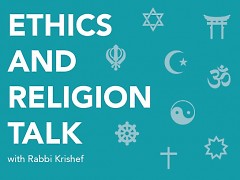Over the years I've heard some Muslims refer to Christians as polytheists. Then we have Christians, who to the best of my knowledge, consider Hindus as polytheists. I would love for you all to shed light on this for me.
My response:
Judaism, as far back as the beginning of Christianity, never saw Christianity as idolatrous. It recognized that early Christianity accepted one God, and when the concept of the trinity took shape, Judaism still recognized that the three aspects of God were nonetheless all part of one God. Judaism recognized Islam as a pure form of monotheism. Hinduism is more complicated. Medieval and early modern Jewish sources clearly define it as idolatry. Late 20th century sources argue that the only way to understand the theology of a religion is from the practitioners themselves, rather than from the outside. For this, we need to consult Fred Stella’s description of Hindu Theology in part one of the responses to this question:
“Ultimately, most Hindus would agree that we are monist. This is different from monotheistic. The latter acknowledges one personal God who is separate from His creation. The former indicates the understanding that God has manifested as the physical universe, and that all creation is part of the One Substance. But we cannot deny that Hinduism is rich with a pantheon of deities. Some Hindus acknowledge these as real divine beings who inhabit a spiritual realm and can influence our lives. Others see them as symbolic of the various attributes of the one God known as Brahman.”
From my Jewish perspective, at the core of Hinduism is a belief on one God. Beyond that, if the system of deities is not Biblical idolatry, it feels like idolatry. Nonetheless, I acknowledge similarities between the Jewish Zoharic mystical understanding of the Sephirot - aspects - of God and the understanding of Hindu deities as aspects of Brahmin.
One more issue -- I disagree with those who claim that the God of Christianity or Judaism is different than the God of Islam or Hinduism. If there is only one God, then no matter what name one uses (Allah, Adonai, Jesus, or even Brahmin), we are necessarily calling on the same one transcendant, creative, power.
Dr. Sahibzada, the Director of Islamic Center and Imam of the Mosque of Grand Rapids, responds:
“It is most important to understand clearly Monotheism and Polytheism with the perspective of Moslem faith. Monotheism is called Tauheed in Arabic. It is believing in, following and worshiping strictly One God alone without any interpretation, explanation of a believer to worship God through indirect means or assigning His status to any of His creation: God is Eternal, Absolute, only One without any family and none is like Him.
“Shirk is the Arabic word for polytheism. Shirk is an association of an idol or any object as a partner to God, sharing it in the worship which is only due to God alone. Therefore, anyone who acts upon above will be defined Polytheist.
“The Quran teaches, ‘Worship God alone and associate none with Him.’ The Quran does not record Christians as polytheists. Muslims believe and follow Quranic teachings.”
The Rev. Sandra Nikkel, head pastor of Conklin Reformed Church, responds:
“The word polytheism refers to the worship of various gods. Although Hinduism's concept of God and their worship varies depending of each individual tradition, the practice of polytheism is prevalent. Muslims do not worship various gods. They worship one god--Allah. So they would be monotheists. Judaism and Christianity are monotheists also. They worship Yahweh. However, Christianity believes that Jahweh is One God in three persons--3 consubstantial persons in one God. This fuller revelation of God came with the coming of Jesus whom we believe to be of the same substance of the Father along with the Holy Spirit. So, we worship our Triune God (Father, Son, and Holy Spirit) but also hold that our Triune God is One God.”
Ty Silzer, a former pastor in the Presbyterian Church in America who attends Mars Hill Bible Church, responds:
“Your pitch is pretty accurate. Christians claim to be monotheists, but deterrents call this semantics. The reason for this complication is summed up best by the word Trinity—the idea that one God exists within three Manifestations or Personhoods. But this word doesn’t appear in the Christian scriptures—you see the ingredients within to then later be used to develop this theology, but it’s not spelled out anywhere so neatly. Jesus taught His twelve to baptize in the name of the “Father, Son, and Holy Spirit” (Matthew 28:19). 1 John 5:17 echoes this phrase. ‘Trinity’ as an idea or doctrine was first formulated by Valentinus (oddly enough, a Gnostic), roughly 100 years after the scriptures and coined by Tertullian roughly another 50 years later.”
This column answers questions of Ethics and Religion by submitting them to a multi-faith panel of spiritual leaders in the Grand Rapids area. We’d love to hear about the ordinary ethical questions that come up on the course of your day as well as any questions of religion that you’ve wondered about. Tell us how you resolved an ethical dilemma and see how members of the Ethics and Religion Talk panel would have handled the same situation. Please send your questions to [email protected].
The Rapidian, a program of the 501(c)3 nonprofit Community Media Center, relies on the community’s support to help cover the cost of training reporters and publishing content.
We need your help.
If each of our readers and content creators who values this community platform help support its creation and maintenance, The Rapidian can continue to educate and facilitate a conversation around issues for years to come.
Please support The Rapidian and make a contribution today.
